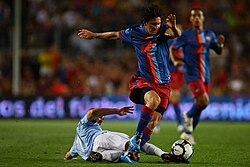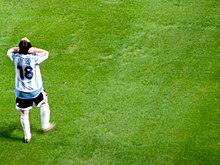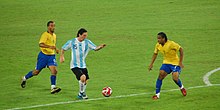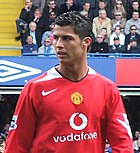Early life
Messi was born on 24 June 1987 in Rosario, Argentina, to parents Jorge Messi, a factory worker, and Celia (née Cuccitini), a part-time cleaner. His paternal family originates from the Italian city of Ancona where his ancestor, Angelo Messi, emigrated to Argentina in 1883. He has two older brothers named Rodrigo and Matías as well as a sister named Maria Sol. At the age of five, Messi started playing football for Grandoli, a local club coached by his father Jorge. In 1995, Messi switched to Newell's Old Boys who were based in his home city Rosario. At the age of 11, he was diagnosed with a growth hormone deficiency. Primera División club River Plate showed interest in Messi's progress, but did not have enough money to pay for the treatment, as it cost $900 a month.Carles Rexach, the sporting director of Barcelona, had been made aware of his talent as Messi had relatives in Lleida, Catalonia, and Messi and his father were able to arrange a trial.Barcelona signed him after watching him play, offering to pay for the medical bills if he was willing to move to Spain.His family moved to Europe and he started in the club's youth teams.Club career
Barcelona
Messi made his unofficial debut for the first team in a friendly match against Porto on 16 November 2003 (at 16 years and 145 days) Less than a year later, Frank Rijkaard let him made his league debut against Espanyol on 16 October 2004 (at 17 years and 114 days), becoming the third-youngest player ever to play for Barcelona and youngest club player who played in La Liga (a record broken by team mate Bojan Krkić in September 2007). When he scored his first senior goal for the club against Albacete on 1 May 2005, Messi was 17 years, 10 months and 7 days old, becoming the youngest to ever score in a La Liga game for Barcelona until 2007 when Bojan Krkić broke this record, scoring from a Messi assist. Messi said about his ex-coach Frank Rijkaard: "I never forget that Rijkaard has launched me. That he gave me confidence as I only sixteen, seventeen years was."2005–06 season
| "Messi I think is like me, he is the best in the world along with Ronaldinho." —Diego Maradona. |
Messi netted six goals in seventeen league appearances, and scored one Champions League goal in six. His season ended prematurely on 7 March 2006, however, when he suffered a muscle tear in his right thigh during the second leg of the second round Champions League tie against Chelsea. Frank Rijkaard's Barcelona ended the season as champions of Spain and Europe.
2006–07 season


2007–08 season

He was nominated for a FIFPro World XI Player Award under the category of Forward. A poll conducted in the online edition of the Spanish newspaper Marca had him as the best player in the world with 77 percent of the vote. Columnists from Barcelona-based newspapers El Mundo Deportivo and Sport stated that the Ballon d'Or should be given to Messi, a view supported by Franz Beckenbauer] Football personalities such as Francesco Totti have declared that they consider Messi to be one of the current best footballers in the world.
Messi was sidelined for six weeks following an injury on 4 March when he suffered a muscle tear in his left thigh during a Champions League match against Celtic. It was the fourth time in three seasons that Messi suffered this type of injury.
2008–09 season

Messi scored his first hat-trick of 2009 in a Copa del Rey tie against Atlético Madrid which Barcelona won 3–1 Messi scored another important double on 1 February 2009, coming on as a second half substitute to help Barcelona defeat Racing Santander 1–2 after being 1–0 down. The second of the two strikes was Barcelona's 5000th league goal. In the 28th round of La Liga, Messi scored his 30th goal of the season in all competitions, helping his team to a 6–0 victory over Málaga CF in the process. On 8 April 2009, he scored twice against Bayern Munich in the Champions' League, setting a personal record of nine goals in the competition. On 18 April, Messi notched his 20th league goal of the season in a 1–0 win at Getafe, allowing Barcelona to maintain their six point advantage at the top of the league table over Real Madrid.

2009–10 season

On 18 September, Messi signed a new contract with Barcelona, running until 2016 and with a buy-out clause of €250 million included, making Messi, along with Zlatan Ibrahimovic, the highest paid players in La Liga, with earnings of around €9.5 million yearly. Four days later, on 22 September, Messi scored two goals and assisted another in Barça's 4–1 win over Racing Santander in La Liga. Messi scored his first European goal of the season on 29 September in a 2–0 win over Dynamo Kyie Messi took his goal tally to six goals in seven games in La Liga with a strike during a 6–1 rout over Real Zaragoza at Camp Nou, and also scored a penalty in Barça's 4–2 win over Mallorca at the Camp Nou on 7 November. On 1 December 2009, Messi was named winner of the 2009 Ballon d'Or, beating runner-up Cristiano Ronaldo by a huge margin of 473 to 233. Afterwards, France Football magazine quoted Messi as saying: "I dedicate it to my family. They were always present when I needed them and sometimes felt even stronger emotions than me." On 19 December, Messi scored the winner in the final of the 2009 FIFA Club World Cup against Estudiantes in Abu Dhabi. Two days later, he was given the FIFA World Player of the Year award; beating Cristiano Ronaldo, Xavi, Kaká and Andrés Iniesta to the award. This was the first time he had won the award, and he became the first Argentinean to ever receive this honoure On 10 January 2010, Messi scored his first hat-trick in 2010 and his first hat-trick of the season against CD Tenerife in the 0–5 victory On 17 January, Messi scored his 100th goal for the club in the 4–0 victory over Sevilla.
International career
In June 2004, he debuted for Argentina, playing in an under-20 friendly match against Paraguay. In 2005 he was part of a team that won the 2005 FIFA World Youth Championship in the Netherlands. There, he won the Golden Ball and the Golden Shoe.He made his full international debut on 17 August 2005 against Hungary at 18 years of age. He was substituted on during the 63rd minute, but was sent off on the 65th minute because the referee, Markus Merk, found he had elbowed defender Vilmos Vanczák, who was tugging Messi's shirt. The decision was contentious and Maradona even claimed the decision was pre-meditated. Messi returned to the team on 3 September in Argentina's 1–0 World Cup qualifier away defeat to Paraguay. Ahead of the match he had said "This is a re-debut. The first one was a bit short." He then started his first game for Argentina against Peru; after the match Pekerman described Messi as "a jewel".
On 28 March 2009, in a World Cup Qualifier against Venezuela, Messi wore the Argentine number 10 jersey for the first time. This match was the first official match for Diego Maradona as the Argentina coach. Argentina won the match 4–0 with Lionel Messi opening the scoring.
2006 FIFA World Cup
The injury that kept Messi from playing for two months at the end of the 2005–06 season jeopardised his presence in the World Cup. Nevertheless, Messi was selected in the Argentina squad for the tournament on 15 May 2006. He also played in the final match before the World Cup against the Argentine U-20 team for 15 minutes and a friendly match against Angola from the 64th minute. He witnessed Argentina's opening match victory against Ivory Coast from the substitute's bench. In the next match against Serbia, Messi became the youngest player to represent Argentina at a World Cup when he came on as a substitute for Maxi Rodríguez in the 74th minute. He assisted Hernán Crespo's goal within minutes of entering the game and also scored the final goal in the 6–0 victory, making him the youngest scorer in the tournament and the sixth youngest goalscorer in the history of the World Cup. Messi started in Argentina's following 0–0 tie against the Netherlands. In the following game against Mexico, Messi came on as a substitute in the 84th minute, with the score tied at 1–1. He appeared to score a goal, but it was ruled offside with Argentina needing a late goal in extra time to proceed. Coach José Pekerman left Messi on the bench during the quarter-final match against Germany, which they lost 4–2 on a penalty shootout.2007 Copa América

His second game was against Colombia, in which he won a penalty that Crespo converted to tie the game at 1–1. He also played a part in Argentina's second goal as he was fouled outside the box, which allowed Juan Roman Riquelme to score from a freekick, and increase Argentina's lead to 3–1. The final score of the game was 4–2 in Argentina's favor and guaranteed them a spot in the tournament's quarterfinals.
In the third game, against Paraguay the coach rested Messi having already qualified for the quarter-finals. He came off the bench in place of Esteban Cambiasso in the 64th minute, with the score at 0–0. In the 79th minute he created a goal for Javier Mascherano. In the quarter-finals, as Argentina faced Peru, Messi scored the second goal of the game, from a Riquelme pass in a 4–0 win. During the semi-final match against Mexico, Messi scored a lob over Oswaldo Sánchez to see Argentina through to the final with a 3–0 win.Argentina went on to lose 3–0 to Brazil in the final.

2008 Summer Olympics
Having barred Messi from playing for Argentina in the 2008 Olympics,Barcelona agreed to release him after he held talks with Josep Guardiola. He joined the Argentina squad and scored the first goal in a 2–1 victory over Ivory Coast. He then scored the opening goal and assisted Ángel Di María in the second to help his side to a 2–1 extra-time win against the Netherlands. He also featured in Argentina's match against rivals Brazil, in which Argentina took a 3–0 victory, thus advancing to the final. In the gold medal match, Messi again assisted Di María for the only goal in a 1–0 victory over Nigeria.Personal life
Messi was at one stage romantically linked to Macarena Lemos, also from his hometown of Rosario. He is said to have been introduced to her by the girl's father when he returned to Rosario to recover from his injury a few days before the start of the 2006 World Cup. He has in the past also been linked to the Argentine model, Luciana Salazar. In January 2009 he told "Hat Trick Barça", a programme on Canal 33: "I have a girlfriend and she is living in Argentina, I am relaxed and happy". He was seen with the girl, Antonella Roccuzzo, at a carnival in Sitges after the Barcelona-Espanyol derby. Roccuzzo is a fellow native of Rosario. They plan to wed near the end of 2010.He is featured on the front cover of the video game Pro Evolution Soccer 2009 and is also involved in promotional campaigns for the game. Messi, along with Fernando Torres, is the face of Pro Evolution Soccer 2010, and was also involved in the motion capturing and the trailer. Messi is sponsored by the German sportswear company Adidas and features in their television advertisements.
H
Club statistics
As of 23 January 2010| Club | Season | League | Cup | Europe | Club World Cup | Total | ||||||||||
|---|---|---|---|---|---|---|---|---|---|---|---|---|---|---|---|---|
| Apps | Goals | Assists | Apps | Goals | Assists | Apps | Goals | Assists | Apps | Goals | Assists | Apps | Goals | Assists | ||
| Barcelona | 2004–05 | 7 | 1 | 0 | 1 | 0 | 0 | 1 | 0 | 0 | - | - | - | 9 | 1 | 0 |
| 2005–06 | 17 | 6 | 3 | 2 | 1 | 0 | 6 | 1 | 1 | - | - | - | 25 | 8 | 4 | |
| 2006–07 | 26 | 14 | 2 | 4 | 2 | 1 | 6 | 1 | 0 | 0 | 0 | 0 | 36 | 17 | 3 | |
| 2007–08 | 28 | 10 | 12 | 3 | 0 | 0 | 9 | 6 | 1 | - | - | - | 40 | 16 | 13 | |
| 2008–09 | 31 | 23 | 11 | 8 | 6 | 2 | 12 | 9 | 5 | - | - | - | 51 | 38 | 18 | |
| 2009–10 | 16 | 15 | 7 | 4 | 3 | 0 | 6 | 2 | 1 | 2 | 2 | 0 | 28 | 22 | 8 | |
| Career totals | 125 | 69 | 35 | 22 | 12 | 3 | 40 | 19 | 8 | 2 | 2 | 0 | 189 | 102 | 46 | |
International goals
Honours
Barcelona
- Spanish League (3): 2004–05, 2005–06, 2008–09
- Spanish Cup: (1) 2008–09
- Spanish Supercup (3): 2005, 2006, 2009
- UEFA Champions League (2): 2005–06, 2008–09
- UEFA Super Cup (1): 2009
- FIFA Club World Cup (1): 2009
International
- FIFA U-20 World Cup: 2005
- Olympic Gold Medal: 2008
Individual
- FIFA U-20 World Cup Top Scorer: 2005
- FIFA U-20 World Cup Player of the Tournament: 2005
- Copa América Young Player of the Tournament: 2007
- U-21 European Footballer of the Year: 2007
- Player of the Year of Argentina: 2005, 2007, 2009
- FIFPro Special Young Player of the Year: 2006–2007, 2007–2008
- FIFPro World Young Player of the Year: 2005–2006, 2006–2007, 2007–2008
- World Soccer Young Player of the Year: 2005–2006, 2006–2007, 2007–2008
- Premio Don Balón (Best Foreign Player in La Liga): 2006–2007, 2008–2009
- EFE Trophy (Best Ibero-American Player in La Liga): 2006–2007, 2008–2009
- FIFPro World XI: 2006–2007, 2007–2008, 2008–2009
- UEFA Team of the Year: 2007–2008, 2008–2009
- FIFA Team of the Year: 2008, 2009
- UEFA Champions League Top Scorer: 2008–2009
- Trofeo Alfredo Di Stéfano: 2008–2009
- UEFA Club Forward of the Year: 2008–2009
- UEFA Club Footballer of the Year: 2008–2009
- LFP Best Player: 2008–2009
- LFP Best Striker: 2008–2009
- Onze d'Or: 2009
- Ballon d'Or: 2009
- World Soccer Player of the Year: 2009
- FIFA Club World Cup Golden Ball: 2009
- Toyota Award: 2009
- FIFA World Player of the Year: 2009
- FIFPro World Player of the Year: 2008–09







